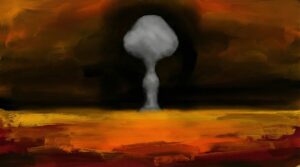
Show Summary
As we move through difficult cultural transitions and rethink our governance systems, it will be critical that we listen to voices that are rooted beyond the conventional Western thinking that has come to dominate our society. As such, it is always an honor when Indigenous leaders share their experiences and wisdom with the broader public.
This week, Casey Camp-Horinek of the Ponca Nation joins Nate to recount her decades of work in Indigenous and environmental activism. Her stories shed light on the often-overlooked struggles and tragedies faced by Indigenous communities in their efforts to restore and safeguard their homelands. Casey also shares her current work advocating for The Rights of Nature – which legalizes the same rights of personhood to Earth’s ecosystems – of which the Ponca Nation was the first tribe in the US to implement.
How is the treatment of Indigenous people under the United States government reflective of the exploitative relationship between industrial systems and the Earth? What is ‘Post-Traumatic Growth’ and how could it assist in healing the deeper cultural wounds obstructing genuine dialogue and change? Could aligning our current laws with the laws of nature – followed by every other species – result in a more sustainable, interconnected, and thriving humanity?
About Casey Camp-Horinek
Casey Camp-Horinek, Councilwoman and Hereditary Drumkeeper of the Women’s Scalp Dance Society of the Ponca Nation of Oklahoma, is a longtime activist, environmentalist, actress, and published author. First taking up the cause of Native and Human Rights in the early ’70s, it has been in the last 15 years that she began her plea for Environmental Justice for her Ponca people and people around the globe. Casey has identified and diligently worked to remediate the corridor of toxic industry surrounding the historic lands of the Ponca people.
Because of Casey’s work, the Ponca Nation is the first Tribe in the State of Oklahoma to adopt the Rights of Nature Statute, and to pass a moratorium on fracking on Tribal Lands. Casey was also instrumental in the drafting and adoption of the first ever International Indigenous Women’s Treaty protecting the Rights of Nature. Casey is a board member for Women’s Earth and Climate Action Network, Movement Rights, as well as Earthworks. Casey Camp-Horinek has also been a film actor since 1988, starring in Avatar: The Last Airbender, Winter in the Blood, Barking Water and Goodnight Irene.
In French, we have a motto that says that a simple drawing is often better than a long explanation. Jean-Marc Jancovici Carbone 4 President
That’s very understandable because with left atmosphere thinking, one of the problems is that you see everything as a series of problems that must have solutions. Iain McGilchrist Neuroscientist and Philosopher
We can’t have hundreds and hundreds of real relationships that are healthy because that requires time and effort and full attention and awareness of being in real relationship and conversation with the other human. Nate Hagens Director of ISEOF
This is the crux of the whole problem. Individual parts of nature are more valuable than the biocomplexity of nature. Thomas Crowther Founder Restor
Show Notes & Links to Learn More
Download transcript00:00 – Casey Camp-Horinek Works + Info, Rights of Nature
01:06 – Ponca People, Nebraska and Oklahoma
01:47 – Ponca adoption of the Rights of Nature
03:13 – Bioneers
08:06 – Doctrine of discovery, US colonization, Boarding school system
08:54 – Nebraska indigenous forced removal
09:23 – Stockholm Syndrome
10:33 – American Indian Movement, Civil Rights Movement
11:58 – Forced sterilizations among indigenous women
12:45 – Indigenous Marches on Washington, Trail of Broken Treaties
12:59 – Battle at Wounded Knee 1973
14:26 – Watergate
24:19 – Environmental degradation in Ponca Territory, Conoco’s Phillips 66
14:56 – Office of Indian Affairs developed under the Department of War, now under the Department of the Interior
26:06 – Mortality during forced migration of indigenous people
27:04 – Ponca Treaties, Ponca land theft for petroleum and waste dumping
28:14 – Navajo people, Nuclear Waste
30:58 – Standing Rock
31:45 – Non-violent direct action
34:27 – The Cultural Transformation of a Native American Family and Its Tribe: 1763-1995, a Basket of Apples
38:07 – Behavior modification
40:35 – Science and indigenous teachings
43:22 – Kenny Ausubel, Shannon Biggs
50:02 – The hundredth Monkey study
55:06 – Post-traumatic Growth, Anitra Warrior
55:25 – Missing and murdered indigenous women
1:02:18 – The importance of ritual
1:06:04 – International Rights of Rivers, Ponca adoption
1:06:43 – Osprey Orielle Lake, Women’s Earth and Climate Action Network
1:07:59 – Freedom of Religion Act
1:06:43 – Ecuador Rights of Nature, Whanganui River, The Māori People
1:12:01 – Water pollution from fracking and mining
1:14:21 – Pella Thiel, TGS Episode
1:14:42 – Nina Simons, TGS Episode, Iroquois questioning absence of women decision-makers/slavery in colonial governing
1:26:09 – Civil Disobedience
1:29:44 – 7th Generation Philosophy






